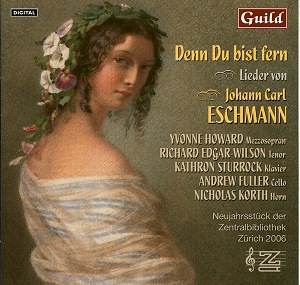Guild Recordings is
a good source for obscure composers
overlooked by major recording companies.
Their series on Rebecca Clarke was an
eye-opener, sparking a revival of the
British composerís much underrated music.
Here they return to another speciality,
Swiss music.
Johann Carl Eschmann
was born in Winterthur. He studied music
in Leipzig, for a short time getting
lessons from Mendelssohn himself. He
spent the rest of his life teaching
and playing music in the Zürich
area. While playing for the Allgemeinen
Musik-Gesellschaft Zürich, he came
into contact with no less than Richard
Wagner, who conducted the ensemble.
Wagnerís arrangement for the fifth of
his Wesendonck songs for solo violin
and orchestra was inscribed in Eschmannís
honour.
Let us not think though,
that the association with Wagner led
to any great music on Eschmannís part.
These songs are a vignette into what
was heard in cultivated music circles
of the time. Eschmann has a gift for
a lyrical melodic line, underpinned
by a strong piano part. They must be
a pleasure to perform, for they are
unfussy, yet harmonious, and need no
special virtuoso skills.
The first two songs,
to poems by "Pauline E", possibly
a relative of the composer, have a certain
honest, homely charm. When Eschmann
sets a major poet like Eichendorff,
he tends to follow the line of text
with minimal accompaniment. These poems
are Eichendorff at his more pietist,
safe homilies about God and virtue.
Eschmann has the sense not to overpower
them with fancy effects. They come across
as very minor Schumann, or Mendelssohn:
nothing to frighten the horses, but
enough to enjoy in the confines of a
middle class salon.
More unusual are the
settings of August Corrodi (1826-1885),
a Swiss poet, artist and translator
(into Swiss-German) of other European
poetry. Here we have no less than fourteen
poems by Corrodi, each one strophic,
extolling simple Romantic virtues of
nature, love and goodwill. This is nineteenth
century music at its most intimate,
music by one friend to poems by another.
Presumably they were performed among
friends, as well. Eschmann sometimes
nods to Schubert or Loewe, as in Irrlicht
where two lovers get lost in a dark
wood but are sucked into a bog and killed
before they can escape. What frisson
that long ago singer must have mustered,
to the delight of his companions! In
Mittags, Eschmann attempts a
more complex, rolling accompaniment,
to describe the fresh mountain stream
that he follows while walking down from
the mountains. To audiences of the time,
that would have been a common occurrence,
one with which they could identify.
Similarly, Corrodi writes of cold foggy
evenings in Herbstnebel, humorously
suggesting that the cure is a touch
of alcohol! We have lost that intimate
connection with time and situation Eschmann
and his circle would have taken for
granted. If these performances leave
a lot to be desired, thatís no demerit,
for the performers in Eschmann and Corrodiís
time were ordinary people and friends.
To us, these are "just" songs
and not very spectacular at that. But
to them, these were a direct expression
of the lives they experienced, and the
values they respected. They were not
writing for the wider world or for posterity,
but for their own cultivation.
Ultimately it is in
these terms that the recording needs
to be assessed. So little is known of
Swiss poetry and music that it is important
to collect such work together. Moreover,
because it has no pretensions to be
anything other than it is, it is all
the more a glimpse into a long lost
world of private musicianship in an
era long before ours. Nineteenth century
Zürich might not have the gloss
and glamour of Vienna, Berlin or Munich,
but its people enjoyed themselves nonetheless,
and made music that drew them together.
Itís not something to be sniffed at.
Although this recording
was made in Suffolk in 2004, the notes
refer to a custom by which the Central
Library in Zürich became, each
New Year, the focus of community celebrations
of music. The citizens contributed to
heating the snowbound hall, hiring musicians
and enjoying music for its own sake.
We should be envious of their dedication
and sincerity.
Anne Ozorio


